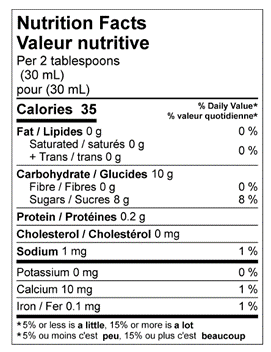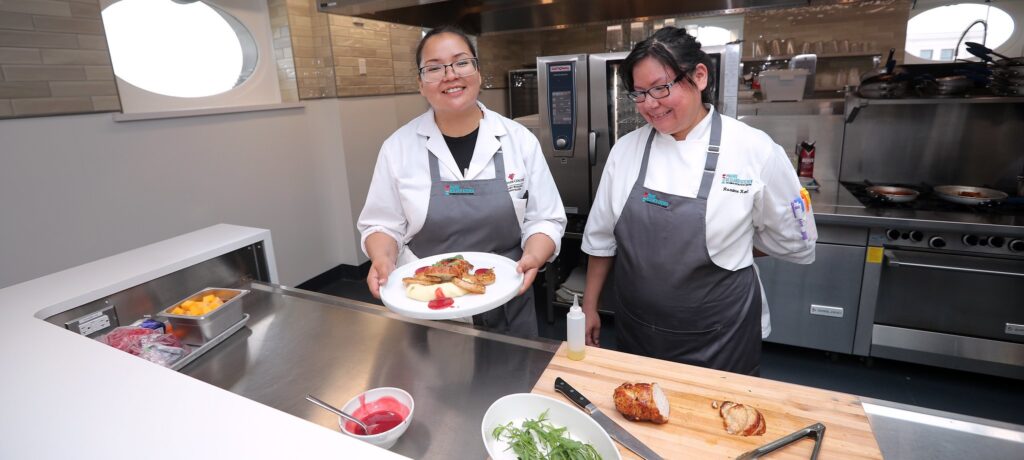Reclamation, Research and Recipes
RRC Polytech student partners with Prairie Research Kitchen to create a new sauce honouring Indigenous heritage
For student Rayne Ryle-Cote, who is Anishinaabe (mother from Lake St. Martin, father from Cote First Nation), taking a chance on new path has led to a tasty new venture with RRC Polytech’s Prairie Research Kitchen.
Following the challenges that came along with the pandemic, Rayne was looking for a new direction in her life when she discovered the Compass Skills program at RRC Polytech, which was all about career exploration, goal-setting, and self-refection – an environment she says was a safe and inspiring space. Compass Skills is a holistic Indigenous-led 10-week program focused on creating a foundation of skills to enter employment and/or further education.
“I lost everything. I was in a dark spot and I was lost. My friend told me about this program, and when I learned how it can help me find employment and also provided cultural teachings, I instantly signed up.”
Along with seeking a new path of employment, Rayne also yearned to access Indigenous teachings, something her family did not pass down out of fear.
“My family went through a lot with Residential Schools, and it affected them largely where they were so afraid for me and my sisters. But I was always interested in learning about my culture. I always wanted to learn how to bead or how to make a drum and sing in Ojibwe. It was always in me, but I didn’t have access to it.”
During the program, Rayne expressed her interests in cooking. First inspired by her mother, she grew to love cooking, hosting and how food brought people together. Her and her sisters even took over preparing the large family Christmas meal which brings her so much joy and pride. She didn’t realize that her skills and interests could be transferrable towards a career.
“I shared my dream with my teachers of becoming a chef, and to create or modernize Indigenous recipes, and that I wanted to travel. I really do love the Compass Skills program. It provided an environment where I could create my goals and feel comfortable learning about my culture. I realized my full potential.”
With no prior formal culinary training, her instructors in Compass Skills helped her create a road map to achieve her goals. After being connected with the Prairie Research Kitchen, she was hired as a co-op student for the summer.
The Prairie Research Kitchen operates out of RRC Polytech’s Paterson GlobalFoods Institute in Winnipeg’s Exchange District and offers creative solutions to support food processors and food service providers through research and development, technical services and training. The Prairie Research Kitchen brings together a unique blend of food science and culinary arts to develop solutions for our clients
“I didn’t realize what kind of journey it would take me on and how much my life would change. I would have never thought of working at the Prairie Research Kitchen. It’s been a dream job, and I’m so grateful to be working here.”
Following some initial training, for her co-op, Rayne was invited to create a new sauce with the support and mentorship of the PRK team. With her product creation, she says it was vital to integrate her culture, family, and part of herself.
She was inspired by her grandparents love for cranberry sauce – which was always a meal-side staple for meats, fish and Bannock. But she also wanted the sauce to include notes of sweet and sour, a personal favourite.
“I wanted to incorporate more berries that were accessible to the Prairies where my ancestors had lived so I have cranberries, raspberries and dried juniper berries in the sauce.”
It took some time to experiment to get the right balance and texture. For example, the dried juniper berries didn’t blend in as well so the team suggested cooking the ingredient in vinegar first which remedied the texture.
Rayne says the sauce can be used as a dipping or coating sauce and would work best with meatballs, fried fish, chicken nuggets, and fried Bannock.
It was also very important for her to have an Anishinaabemowin name for the sauce to honour her heritage have the project immediately representative of Indigenous culture. She worked with RRC Polytech Indigenous Language Instructor Corey Whitford to name the sauce Wiishkobi dago zhiiwizipogwad mawinzwaanwinan baashkiminasigan (sweet and sour berry sauce).
She is working through the next steps with the PRK to upscale the production and create packaging. Of the whole process, working with the PRK team has been her favourite part. Walking in with the stigma that the food industry might be isolating and difficult, she has felt embraced, supported and welcomed.
“The PRK works in a team environment and they are so friendly. It feels so good to know that like the PRK I’m always going have a team with me wherever I go and whatever kitchen I go into. I know I’m going be OK because I’m going have a team. So I’m really excited for that.”
In the fall, she will continue her studies with the Culinary Skills Indigenous program at the Notre Dame Campus. She dreams of culinary career that will take her coast to coast working with Indigenous people – learning and sharing her teachings along the way.
Name in Anishinaabemowin (Ojibwe)
Wiishkobi dago zhiiwizipogwad mawinzwaanwinan baashkiminasigan
English translation:
Sweet and sour berry sauce
Ingredients:
Water, honey, cranberries, raspberry puree, vinegar, juniper berry, cornstarch
Ingredient translation into Anishinaabemowin
Ingredients: Dagonigaadewinan
Water Nibi
Honey Aamoo-ziinzibaakwad
Cranberries Mashkiigiminag
Raspberries Miskominag
Juniper berries infused vinegar Gaagaagiwaandagominag dago zhiiwaaboo
Food starch modified Ashkaawangi-bakwezhigan


